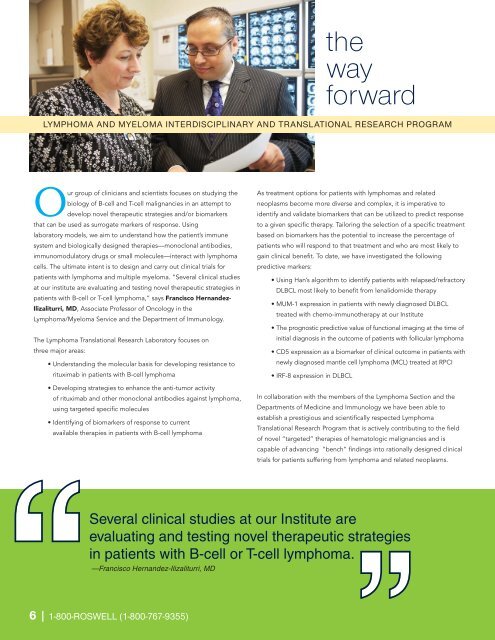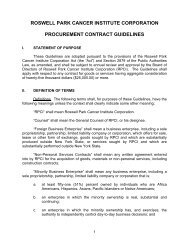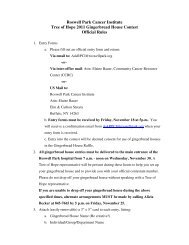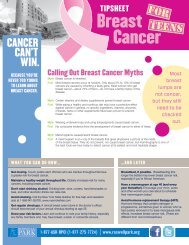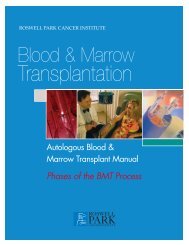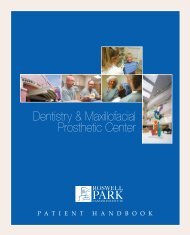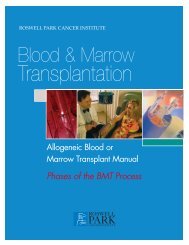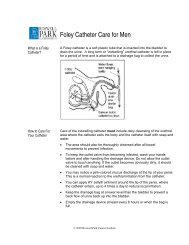Lymphoma and Myeloma Newsletter - Roswell Park Cancer Institute
Lymphoma and Myeloma Newsletter - Roswell Park Cancer Institute
Lymphoma and Myeloma Newsletter - Roswell Park Cancer Institute
You also want an ePaper? Increase the reach of your titles
YUMPU automatically turns print PDFs into web optimized ePapers that Google loves.
thewayforwardLYMPHOMA AND MYELOMA INTERDISCIPLINARY AND TRANSLATIONAL RESEARCH PROGRAMOur group of clinicians <strong>and</strong> scientists focuses on studying thebiology of B-cell <strong>and</strong> T-cell malignancies in an attempt todevelop novel therapeutic strategies <strong>and</strong>/or biomarkersthat can be used as surrogate markers of response. Usinglaboratory models, we aim to underst<strong>and</strong> how the patient’s immunesystem <strong>and</strong> biologically designed therapies—monoclonal antibodies,immunomodulatory drugs or small molecules—interact with lymphomacells. The ultimate intent is to design <strong>and</strong> carry out clinical trials forpatients with lymphoma <strong>and</strong> multiple myeloma. “Several clinical studiesat our institute are evaluating <strong>and</strong> testing novel therapeutic strategies inpatients with B-cell or T-cell lymphoma,” says Francisco Hern<strong>and</strong>ez-Ilizaliturri, MD, Associate Professor of Oncology in the<strong>Lymphoma</strong>/<strong>Myeloma</strong> Service <strong>and</strong> the Department of Immunology.The <strong>Lymphoma</strong> Translational Research Laboratory focuses onthree major areas:• Underst<strong>and</strong>ing the molecular basis for developing resistance torituximab in patients with B-cell lymphoma• Developing strategies to enhance the anti-tumor activityof rituximab <strong>and</strong> other monoclonal antibodies against lymphoma,using targeted specific molecules• Identifying of biomarkers of response to currentavailable therapies in patients with B-cell lymphomaAs treatment options for patients with lymphomas <strong>and</strong> relatedneoplasms become more diverse <strong>and</strong> complex, it is imperative toidentify <strong>and</strong> validate biomarkers that can be utilized to predict responseto a given specific therapy. Tailoring the selection of a specific treatmentbased on biomarkers has the potential to increase the percentage ofpatients who will respond to that treatment <strong>and</strong> who are most likely togain clinical benefit. To date, we have investigated the followingpredictive markers:• Using Han’s algorithm to identify patients with relapsed/refractoryDLBCL most likely to benefit from lenalidomide therapy• MUM-1 expression in patients with newly diagnosed DLBCLtreated with chemo-immunotherapy at our <strong>Institute</strong>• The prognostic predictive value of functional imaging at the time ofinitial diagnosis in the outcome of patients with follicular lymphoma• CD5 expression as a biomarker of clinical outcome in patients withnewly diagnosed mantle cell lymphoma (MCL) treated at RPCI• IRF-8 expression in DLBCLIn collaboration with the members of the <strong>Lymphoma</strong> Section <strong>and</strong> theDepartments of Medicine <strong>and</strong> Immunology we have been able toestablish a prestigious <strong>and</strong> scientifically respected <strong>Lymphoma</strong>Translational Research Program that is actively contributing to the fieldof novel “targeted” therapies of hematologic malignancies <strong>and</strong> iscapable of advancing “bench” findings into rationally designed clinicaltrials for patients suffering from lymphoma <strong>and</strong> related neoplasms.Several clinical studies at our <strong>Institute</strong> areevaluating <strong>and</strong> testing novel therapeutic strategiesin patients with B-cell or T-cell lymphoma.—Francisco Hern<strong>and</strong>ez-Ilizaliturri, MD6 | 1-800-ROSWELL (1-800-767-9355)


